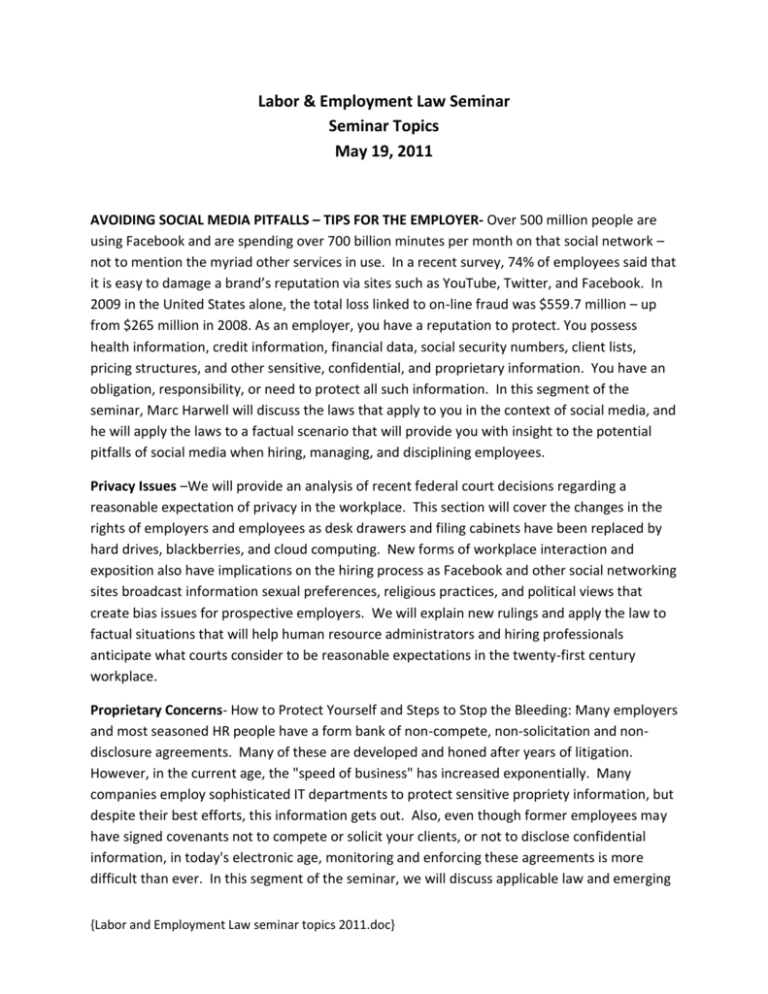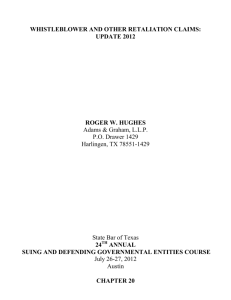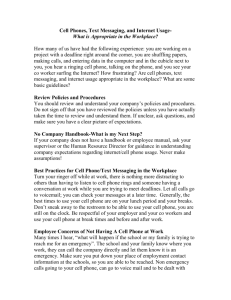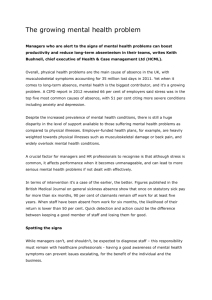Labor and Employment Law seminar topics 2011
advertisement

Labor & Employment Law Seminar
Seminar Topics
May 19, 2011
AVOIDING SOCIAL MEDIA PITFALLS – TIPS FOR THE EMPLOYER- Over 500 million people are
using Facebook and are spending over 700 billion minutes per month on that social network –
not to mention the myriad other services in use. In a recent survey, 74% of employees said that
it is easy to damage a brand’s reputation via sites such as YouTube, Twitter, and Facebook. In
2009 in the United States alone, the total loss linked to on-line fraud was $559.7 million – up
from $265 million in 2008. As an employer, you have a reputation to protect. You possess
health information, credit information, financial data, social security numbers, client lists,
pricing structures, and other sensitive, confidential, and proprietary information. You have an
obligation, responsibility, or need to protect all such information. In this segment of the
seminar, Marc Harwell will discuss the laws that apply to you in the context of social media, and
he will apply the laws to a factual scenario that will provide you with insight to the potential
pitfalls of social media when hiring, managing, and disciplining employees.
Privacy Issues –We will provide an analysis of recent federal court decisions regarding a
reasonable expectation of privacy in the workplace. This section will cover the changes in the
rights of employers and employees as desk drawers and filing cabinets have been replaced by
hard drives, blackberries, and cloud computing. New forms of workplace interaction and
exposition also have implications on the hiring process as Facebook and other social networking
sites broadcast information sexual preferences, religious practices, and political views that
create bias issues for prospective employers. We will explain new rulings and apply the law to
factual situations that will help human resource administrators and hiring professionals
anticipate what courts consider to be reasonable expectations in the twenty-first century
workplace.
Proprietary Concerns- How to Protect Yourself and Steps to Stop the Bleeding: Many employers
and most seasoned HR people have a form bank of non-compete, non-solicitation and nondisclosure agreements. Many of these are developed and honed after years of litigation.
However, in the current age, the "speed of business" has increased exponentially. Many
companies employ sophisticated IT departments to protect sensitive propriety information, but
despite their best efforts, this information gets out. Also, even though former employees may
have signed covenants not to compete or solicit your clients, or not to disclose confidential
information, in today's electronic age, monitoring and enforcing these agreements is more
difficult than ever. In this segment of the seminar, we will discuss applicable law and emerging
{Labor and Employment Law seminar topics 2011.doc}
problems in these areas, and some concrete examples of ways to utilize injunctive relief and
civil courts once you have determined that violations of these agreements have occurred.
Whistleblowing – There is a multitude of federal and state statutes and common law causes of
action that provide protections to employees in a variety of workplace settings that fall under
the general category of “whistleblower.” We will provide an analysis of recent federal and state
court decisions and regulatory developments regarding whistleblower claims by employees.
This section will consider factual scenarios that may give rise to whistleblower claims while
addressing the impact of social media and other forms of electronic communication on such
claims. We will offer guidance to human resource professionals on ways to minimize the
chances of a successful whistleblower claim in the context of evolving workplace standards and
conditions.
Background Checks- How much do you really know about the person sitting across the
interview table from you? Are they trustworthy? What about their past? What if they become
an embarrassment to your company? And what if your boss wants to know who hired this
person? In this session, you will learn what steps you and your company can do to minimize
the risk of nasty surprises without being accused of wrongfully invading an applicant's privacy.
Employee Retaliation Claims on the Rise- Employee retaliation claims have soared recently as
a result of extensive layoffs, companies closing, and general job insecurity in tough economic
times. Jury awards against employers in these suits can be staggering. Employers and their
counsel must take proactive steps to minimize the risk of employee claims alleging retaliation.
Procedures outlining how to report discrimination or harassment along with consistently
enforced anti-retaliation policies are essential. Further, defending litigation alleging retaliatory
conduct requires strategic choices regarding what information to present to the judge or jury.
Missteps during litigation could result in significant damages for the employee. We will discuss
current legal developments regarding retaliation claims and litigation, as well as outline best
practices for employers to reduce the risk of EEOC charges alleging retaliation and to increase
the likelihood of success in litigation.
{Labor and Employment Law seminar topics 2011.doc}








